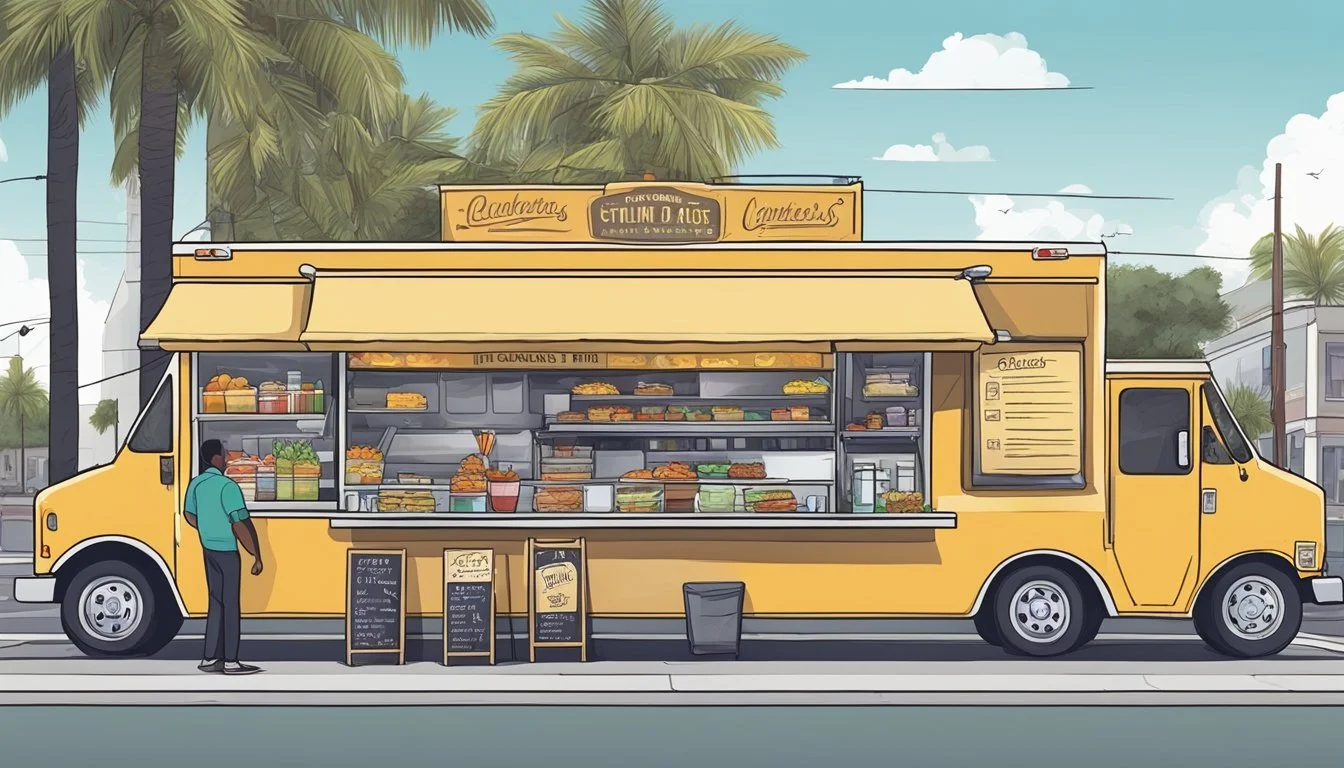Food Truck Laws Tampa, Florida
Navigating Regulations for Mobile Eateries
In Tampa, Florida, food truck operators must navigate an array of regulations to ensure their mobile cuisine ventures comply with local laws. These regulations cover health and safety standards, business licensing, and specific operational rules that pertain to food truck vendors in the city. Failure to adhere to these regulations can result in penalties, including fines and the suspension of the ability to operate.
Compliance with the health and safety standards set forth by the State of Florida's Department of Business Regulations, Division of Hotels and Restaurants, is a cornerstone for operating food trucks in Tampa. These provisions aim to protect the public and ensure that food is prepared, handled, and served in a manner that meets established guidelines. Essential documentation, including proof of a valid policy number from insurance that covers the food truck operation, must be kept current and available for inspection.
Additionally, understanding and securing the correct permits and licenses is crucial for the legality of food truck operations. The laws pertaining to food truck licenses and permits define a clear framework within which vendors must operate. Operators are encouraged to familiarize themselves with the specific requirements and application processes provided by the City of Tampa and the Florida Department of Agriculture and Consumer Services to secure all necessary permits, without which they cannot do business legally on the streets of Tampa.
Understanding Food Truck Regulations in Tampa
Navigating the intricate landscape of food truck regulations in Tampa requires a grasp of both state-wide mandates and local ordinances. Each set of rules plays a pivotal role in the operation of food trucks.
State vs. Local Jurisdiction
Florida's regulatory environment is characterized by a blend of state-level statutes and local ordinances. The State of Florida sets baseline regulations for food trucks, encompassing health, safety, and sanitation standards. However, local governments, like the City of Tampa, can impose additional requirements tailored to their municipality. This distinction is critical; while state laws apply universally to all food truck operators in Florida, compliance with local laws is equally obligatory to operate within Tampa's jurisdiction without encountering legal issues.
Tampa-Specific Food Truck Laws
The City of Tampa outlines particular mandates that food truck vendors must follow, adding an extra layer atop state regulations. Operators in Tampa must comply with local zoning laws, which determine where food trucks can park and operate. Tampa also requires food truck vendors to maintain proper licenses and permits, as detailed on the official City of Tampa website. These documents include, but are not limited to, a copy of the truck's Division of Hotels and Restaurants license and proof of a current fire inspection. The recent ordinance revisions mentioned in Tampa's draft ordinance indicate a dynamic legal framework that vendors must continually monitor to ensure they remain compliant. Notably, preemption is a point of concern; although Florida has considered laws that forbid local jurisdictions from imposing certain restrictions, Tampa still exercises its authority over food trucks within city limits.
Starting Your Food Truck Business
Before launching a food truck business in Tampa, Florida, it is crucial to structure your business entity correctly, ensure all licensing is in order, and comply with specific vehicle requirements. These foundational steps set the stage for a legally compliant and smoothly operated food truck venture.
Creating Your Business Entity
Choosing the right business entity is a defining step for prospective food truck owners. Options such as Limited Liability Companies (LLCs) or sole proprietorships are commonplace. An LLC offers liability protection and potential tax benefits, while a sole proprietorship provides simplicity in setup and operations. Irrespective of the choice, registering the entity through Florida's Division of Corporations is mandatory, and obtaining an Employer Identification Number (EIN) from the IRS is necessary for tax purposes.
Acquiring the Necessary Licenses
Beyond forming a business entity, obtaining the correct licenses is essential. In Tampa, food trucks need a business license, also known as a food truck license, from the county or city. Additionally, food truck operators must secure a Mobile Food Establishment Permit from the Florida Department of Agriculture and Consumer Services. Vendors should also carry a Certificate of Insurance (COI) as proof of appropriate insurance coverage.
Food Truck Vehicle Requirements
The vehicle itself must meet stringent criteria set by the Florida Department of Business and Professional Regulation. Requirements include proper installation of commercial food service equipment, adherence to health and safety standards, and regular inspections. A separate commissary may be necessary for food preparation and storage, complying with Florida law which stipulates that food trucks operate in conjunction with a licensed commercial kitchen.
Operational Guidelines for Food Trucks
Food truck operations in Tampa, Florida, must adhere to specific requirements, from menu composition to rigorous safety inspections, to ensure compliance with regulations and a safe dining experience for customers.
Menu and Ingredient Compliance
Food trucks must have their menu and ingredients approved to ensure they meet guidelines for food safety. The Department of Agriculture sets standards for how food items should be handled and prepared to prevent foodborne illnesses. Menus should clearly list ingredients to inform customers, especially those with allergies.
Inspections and Certifications
Regular inspections are a critical component of maintaining food safety standards. Food trucks are required to pass a safety inspection by the Fire Marshal, who checks for proper installation and functioning of fire suppression systems. Additionally, operators must have their food operation license current and readily available for review.
Parking and Location Restrictions
Tampa has specific parking and location restrictions designed to manage food truck operations smoothly. These regulations dictate where and when food trucks can operate, keeping pedestrian and traffic safety in mind. It's important for food truck owners to familiarize themselves with and adhere to these rules to avoid penalties.
Hours and Operations Management
Managing the hours of operation for food trucks is essential for maintaining community harmony and compliance with city ordinances. Tampa food truck operators should clearly establish their business hours while respecting the local regulations related to operational times and noise ordinances. Regular maintenance and repair of the food truck can also prevent operational delays.
Financial Aspects of Operating a Food Truck
Operating a food truck in Tampa, Florida, demands a clear understanding of the various financial burdens such as taxes, fees, and insurance costs. These financial responsibilities are integral to the sustainability and legality of food truck operations.
Understanding Taxes and Fees
In Tampa, food truck vendors are required to navigate several categories of taxes and fees. First, vendors must obtain a tax certificate from the Florida Department of Revenue, which is a prerequisite for sales tax collection. Sales tax must be collected on all food and beverage sales and then remitted to the state.
A Mobile Food Vendor Permit necessitates a certain fee, too, which varies based on the size and nature of the food truck's operation. These costs include application fees, license fees, and potentially, event participation fees. It is imperative that food truck owners budget for recurring fees such as renewals, which are an annual affair.
Insurance and Liability
Maintaining adequate insurance is not just prudent but a legal necessity for food truck owners in Tampa. A comprehensive insurance policy covers several areas:
Liability insurance: Protects against claims resulting from injuries and property damage to others.
Property insurance: Covers the truck and equipment.
Workers' compensation: Necessary if the food truck employs staff.
The exact cost for these insurance policies can vary widely based on the extent of coverage and the specific service provider. Food truck operators should thoroughly compare offers to ensure they are adequately covered without overpaying. Insurance is a critical consideration that safeguards the business against unforeseen events and potential financial pitfalls.
Health, Safety, and Environmental Standards
In Tampa, Florida, food trucks must adhere to strict health and safety regulations, as well as manage their environmental impact responsibly. These standards ensure the well-being of consumers and uphold the integrity of the local food service industry.
Florida Health Regulations for Food Trucks
Food trucks in Florida are required to obtain a mobile food dispensing vehicle license from the Department of Business and Professional Regulation. This license signals compliance with state health and safety standards. Additionally, the Florida Department of Health mandates that food truck operators pass a safety inspection by the Fire Marshal. Food trucks must demonstrate that they have current inspections and adhere to proper food handling practices to prevent health risks.
Operators also need a food manager certification, which ensures they understand foodborne illness prevention, personal hygiene, and time/temperature controls. Prospective food truck vendors are encouraged to contact consumer services for further information on the regulatory requirements.
Environmental Impact and Waste Management
Minimizing the ecological footprint is a priority for food service establishments in Tampa. Food trucks are encouraged to implement best practices in waste management to mitigate environmental impact. They must use potable water responsibly and avoid any contamination of local water resources, which aligns with guidelines set by the Florida Department of Environmental Protection.
Efficient waste disposal methods are monitored by the Florida Department of Agriculture and Consumer Services, ensuring food trucks do not contribute to litter or pollution. By managing waste properly, mobile food vendors play a part in keeping Tampa clean and environmentally friendly.
Additional Resources and Associations
Understanding and navigating the legal requirements for food trucks in Tampa, Florida is vital for success in the mobile food industry. The City of Tampa offers a network of resources aimed at assisting food truck operators with compliance and business growth.
Partnership and Network Building
Food truck owners should begin by engaging with local associations such as the Gulf to Bay Food Truck Association, which provides a platform for collaboration and acts as a unified voice for the mobile food vending industry within the Tampa and St. Pete area. Establishing partnerships with other entities like bars, lounges, and theaters can also drive business and create a symbiotic relationship.
Training and Continuous Education
Ongoing education is essential for mobile food unit operators to remain compliant and prosperous. The City of Tampa has the Bridges to Business program, designed to empower small food businesses through vendor certification and education. Food truck owners must be knowledgeable about the regulations from the Department of Business and Professional Regulation to acquire a food service license, and the importance of securing permits like the mobile food dispensing vehicle license and the mobile food establishment permit. Furthermore, it's crucial to have a commissary letter of agreement and a certified food manager as part of the team.
By leveraging these resources and committing to continuous learning, operators can ensure they meet county regulations and enhance their business operations within the Tampa Bay food scene.
Complying With Zoning and Land Use Laws
In Tampa, Florida, food truck operators must navigate a series of zoning and land use laws to ensure they are conducting business legally. Key compliance factors include understanding the specific zoning requirements and obtaining the necessary permits, especially when operating on private property.
Zoning Requirements
Food trucks in Tampa are subject to zoning regulations that dictate where they can operate. It is crucial that owners verify the designated zones that permit food truck operations. Compliance ensures that food trucks do not face legal issues or fines due to nonconformity with local land use plans.
Permits for Operating on Private Property
When a food truck plans to operate on private property, the owner must obtain approval from Land Development and Zoning. This is especially pertinent if the property is immediately adjacent to an event that the city has approved. Proper permit acquisition is imperative, given that operating without one can lead to towing of the food truck and potentially hefty fines. The permit serves as official authorization to conduct business within the specified private property, ensuring the operator is recognized by local governance.
Serving Alcohol and Obtaining Liquor Licenses
In Tampa, Florida, food truck operators who plan to serve alcohol must navigate a specific set of regulations to obtain the necessary liquor licenses. The state distinguishes between various types of licenses which can influence cost and availability.
For instance, prepackaged food trucks do not typically serve alcohol, but those offering freshly prepared meals may qualify for certain alcohol catering permits:
A 13CT license allows food caterers to serve alcoholic beverages alongside their food service at events.
Mobile Food Facility Permits are crucial but differ from liquor licenses in their intention and scope.
To acquire a license, food truck owners must:
Complete an application with the Division of Alcoholic Beverages and Tobacco (ABT).
Comply with the ABT’s specific requirements for the type of liquor license they are seeking.
Additionally, each food truck serving alcohol must adhere to the same health and safety regulations as static food establishments, ensuring the safe handling and sale of alcoholic beverages.
Operators in Tampa are also encouraged to seek legal counsel or assistance from professionals experienced in alcoholic beverage law to ensure compliance and a smoother application process.
It's important to note that selling alcoholic food products, which are considered solids, falls under different regulations pertaining to food safety, rather than the beverage law.
By understanding and following these guidelines, food truck owners can expand their offerings to include alcoholic beverages, enhancing the dining experience for their patrons.
Closing Remarks
In Tampa, food truck vendors navigate a specific regulatory landscape. They must possess a current State of Florida Department of Business Regulations license, and they are subject to safety inspections by the Fire Marshal's office. Compliance with these regulations guarantees their operation remains within legal standards.
Food trucks in Tampa can find comprehensive guidance on the City of Tampa website. It is crucial for vendors to stay informed about legislative changes. For instance, the Food Truck Freedom Legislation which passed in Florida, as it affects food truck operations statewide.
Local ordinances can also impact operations significantly, as seen in the case of a Polk County city seeking to implement a ban on food trucks. Food truck vendors must, therefore, be vigilant and proactive in understanding and influencing policy changes.
Remaining informed about the local and state regulations is not just about compliance—it's about flourishing in Tampa's food truck scene. Vendors should also capitalize on resources provided by legal firms and interest groups which defend and support their trade, such as the Institute for Justice.
In conclusion, food truck operators in Tampa should ensure they maintain current licenses, prepare for regular safety inspections, and stay apprised of evolving laws to sustain and grow their businesses.








